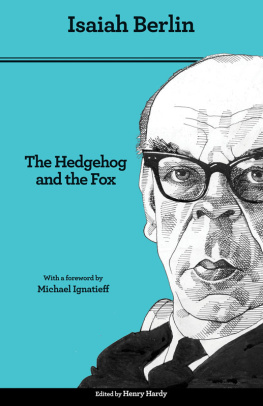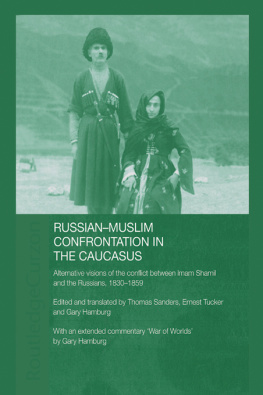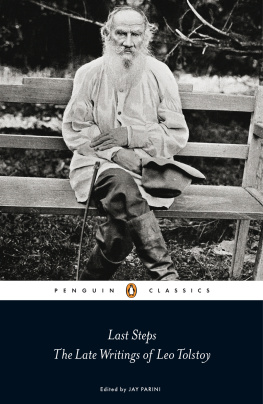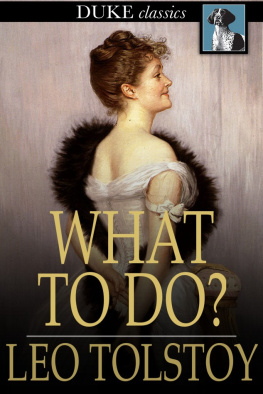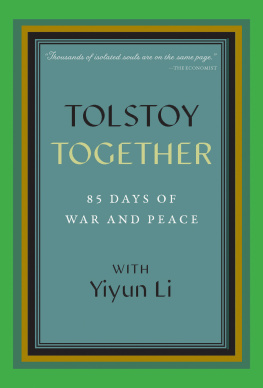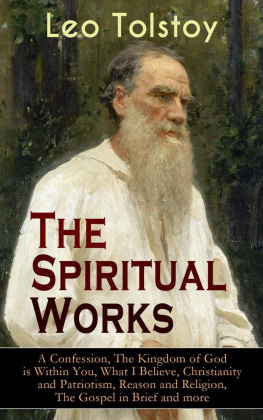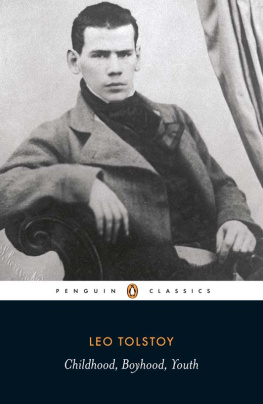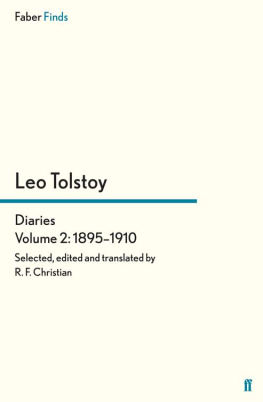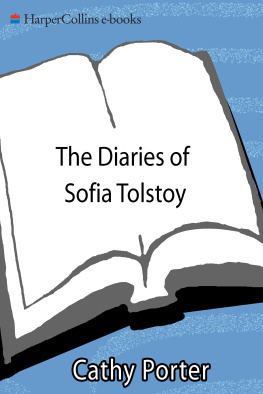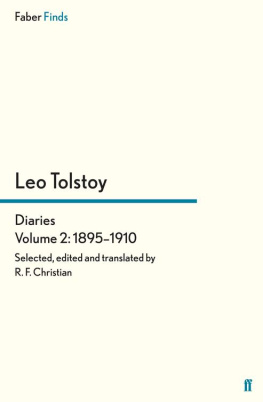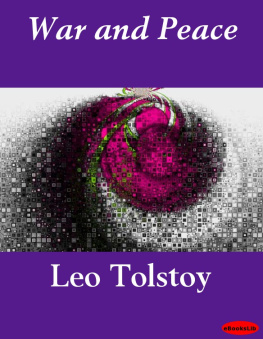
THE HEDGEHOG AND THE FOX
ISAIAH BERLIN WAS BORN IN RIGA, now capital of Latvia, in 1909. When he was six, his family moved to Russia; there in 1917, in Petrograd, he witnessed the March and October Revolutions. In 1921 his family emigrated to England, and he was educated at St Pauls School, London, and Corpus Christi College, Oxford.
At Oxford he was a Fellow of All Souls, a Fellow of New College, Professor of Social and Political Theory and founding President of Wolfson College. He also held the Presidency of the British Academy. In addition to The Hedgehog and the Fox, his main published works are Karl Marx, Russian Thinkers, Concepts and Categories, Against the Current, Personal Impressions, The Crooked Timber of Humanity, The Sense of Reality, The Proper Study of Mankind, The Roots of Romanticism, The Power of Ideas, Three Critics of the Enlightenment, Freedom and Its Betrayal, Liberty, The Soviet Mind and Political Ideas in the Romantic Age . As an exponent of the history of ideas he was awarded the Erasmus, Lippincott and Agnelli Prizes; he also received the Jerusalem Prize for his lifelong defence of civil liberties. He died in 1997.
Henry Hardy, a Fellow of Wolfson College, Oxford, is one of Isaiah Berlins Literary Trustees. He has edited (or co-edited) several other books by Berlin, including the first three volumes of his selected letters, and is currently working on the remaining volume.
Michael Ignatieff, writer, teacher and former politician, is the author of Isaiah Berlin: A Life .
For further information about Isaiah Berlin visit
http://berlin.wolf.ox.ac.uk/
ALSO BY ISAIAH BERLIN
*
Karl Marx
The Age of Enlightenment
Russian Thinkers
Concepts and Categories
Against the Current
Personal Impressions
The Crooked Timber of Humanity
The Sense of Reality
The Proper Study of Mankind
The Roots of Romanticism
The Power of Ideas
Three Critics of the Enlightenment
Freedom and Its Betrayal
Liberty
The Soviet Mind
Political Ideas in the Romantic Age
with Beata Polanowska-Sygulska
Unfinished Dialogue
*
Flourishing: Letters 19281946
Enlightening: Letters 19461960
Building: Letters 19601975
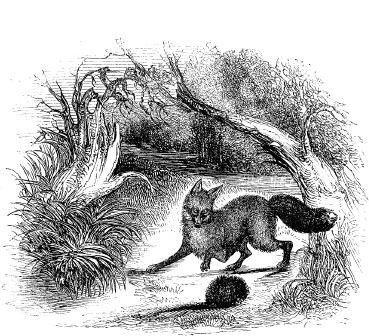
Frontispiece to George Waring, The Squirrels and Other Animals:
Or, Illustrations of the Habits and Instincts of Many of the Smaller
British Quadrupeds (London, [1842])
THE HEDGEHOG
AND THE FOX
AN ESSAY ON TOLSTOYS
VIEW OF HISTORY

ISAIAH BERLIN
Second Edition
Edited by Henry Hardy
Foreword by Michael Ignatieff
PRINCETON UNIVERSITY PRESS
PRINCETON AND OXFORD
Published in the United States of America, its territories, dependencies,
and the Philippine Islands by Princeton University Press, 41 William
Street, Princeton, New Jersey 08540
Requests for permission to reproduce material from this work should be
sent to Permissions, Princeton University Press
press.princeton.edu
First published by Weidenfeld and Nicolson Ltd 1953
This edition is published by arrangement with the Orion Publishing
Group Ltd, London
Copyright Isaiah Berlin 1951, 1953
Second edition The Isaiah Berlin Literary Trust
and Henry Hardy 2013
Editorial matter Henry Hardy 2013
Foreword Princeton University Press 2013
Exchange in the New York Review of Books John S. Bowman,
Jonathan Lieberson, Sidney Morgenbesser and Isaiah Berlin 1980
The moral right of Isaiah Berlin and Henry Hardy to be identified as the
author and editor respectively of this work has been asserted
All Rights Reserved
Library of Congress Cataloging-in-Publication Data
Berlin, Isaiah, 19091997.
The hedgehog and the fox : an essay on Tolstoys view of history /
Isaiah Berlin ; edited by Henry Hardy ;
foreword by Michael Ignatieff. Second Edition.
pages cm
Previously published: London : Weidenfeld & Nicolson, 1953.
Includes index.
ISBN 978-0-691-15600-2 (pbk. : alk. paper) 1. Tolstoy, Leo, graf,
1828-1910KnowledgeHistory. 2. Tolstoy, Leo, graf,
18281910Political and social views. 3. HistoryPhilosophy. I. Hardy,
Henry. II. Title.
PG3415.H5B4 2013
891.733dc23
2012035272
British Library Cataloging-in-Publication Data is available
This book has been composed in Garamond Premier Pro
Printed on acid-free paper 
Printed in the United States of America
1 3 5 7 9 10 8 6 4 2
CONTENTS
FOREWORD
Michael Ignatieff
IT IS WORTH TRYING to understand why this extraordinary essay, first delivered as a lecture in Oxford, then reprinted in an obscure Slavic studies journal in 1951, then re-titled and re-published in 1953, has been enjoying such a robust and enduring afterlife. Along with Two Concepts of Liberty, Berlin then turned into the structuring insight for a great essay on Tolstoy. It has now passed into the culture as a way to classify those around us and to think about two basic orientations towards reality itself.
A hedgehog will not make peace with the world. He is not reconciled. He cannot accept that he knows only many things. He seeks to know one big thing, and strives without ceasing to give reality a unifying shape. Foxes settle for what they know and may live happy lives. Hedgehogs will not settle and their lives may not be happy.
All of us, Berlin suggests, have elements of both fox and hedgehog within us. The essay is an unparalleled portrait of human dividedness. We are riven creatures and we have to choose whether to accept the incompleteness of our knowledge or to hold out for certainty and truth. Only the most determined among us will refuse to settle for what the fox knows and hold out for the certainties of the hedgehog.
The essay endures, in other words, because it is not simply about Tolstoy it is about all of us. We can be reconciled to our sense of reality
A select few refuse to come to terms with reality. They refuse to submit, and seek whether through art or science, mathematics or philosophy to pierce through the many disparate things that foxes know, to a core certainty that explains everything. Karl Marx was such a figure, the most implacable hedgehog of them all.
The grandeur of hedgehogs is that they refuse our limitations. Their tragedy is that they cannot be reconciled to them at the end. Tolstoy was ruthlessly dismissive of every available doctrine of truth, whether religious or secular, yet he could not abandon the conviction that some such ultimate truth could be grasped if only he could overcome his own limitations. Tolstoys sense of unable to be at peace with the irremediable limitations of his own humanity.
This essay asks basic questions of anyone who reads it: What can we know? What does our sense of reality tell us? Are we reconciled to the limits of human vision? Or do we long for something more? If so, what certainty can we hope to achieve one day? Because these are enduring questions of human existence, this great essay will last as long as people come seeking answers.
Available in two of Berlins collections: The Proper Study of Mankind: An Anthology of Essays, ed. Henry Hardy and Roger Hausheer (London, 1997), and Liberty, ed. Henry Hardy (Oxford, 2002).
Michael Ignatieff, Isaiah Berlin: A Life (London, 1998), 2978.
Next page
